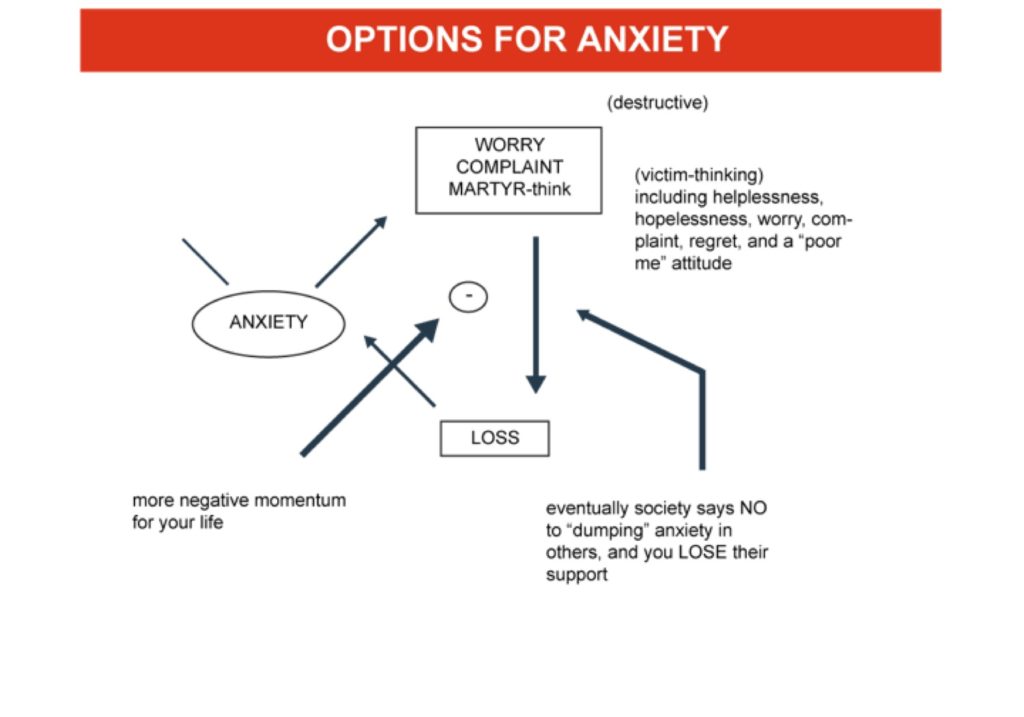Masochism is the destructive, "win/lose" form of anxiety, applied in emotional action. In Romantic Dynamics, it is considered "better" or more promoting of growth than the passivity of addiction. However, it is defined as dumping one's anxiety on another person, through guilt or what has been called, "Passive-aggressiveness," which does offer a "quick-fix" for eliminating the negative energy of anxiety (someone else gets to absorb it.) However, as we know from the laws of thermodynamics, this does not harvest the energy and power of anxiety for any good purpose. It just wastes it, so that the individual does feel temporarily better. Yet, the sources of the anxiety in the first place may then continue, spawning new anxiety, "making a mountain out of a mole-hill," or seeing a "tempest in a teapot," if one does not learn to channel the anxiety into courage, instead.
Courage is "win/win" and constructive, transforming anxiety into confidence, through facing one's fears. Masochism usually causes a backlash from the environment, socially, perhaps legally or financially too. People don't like to be guilted, even if they had something to do with your anxiety. After anxiety and loss or grief get into you, it actually does belong to you. Both are forms of active use of anxiety, which carries with it, the destructive decision to guilt others.
Our decisions are guided and fed by stores of conscience and intuition that are built over a lifetime of decisions, and so the more decisions you make, the more conscience and intuition you build, for making better, more high character decisions in the future, which lead to more success - a crucial element in successful partnership.
Masochism causes us to fall deeper into anxiety emotions via the processes of "poor me" thinking, passive-aggressiveness, and general worry - where we dispel our anxiety by dumping it onto others (causing them a sense of guilt, regret or grief or loss of their own.) This causes them to lash back in further guilting in return, harming us back, with more grief and loss. And so it is a Faustian deal to use masochism, because the temporary reprieve from anxiety causes us even more grief and loss, then more anxiety, then more masochism in both directions - the "worry process" continues. One may then say that masochism is the "Mammalian Brain" mode of expressing anxiety, because it goes hand in hand with the emotions of sadness or depression. It is a means of guaranteeing temporary survival without us having to do actual work. This also links us over to the Anger Map, whose "mammalian brain" option is that of sadness, depression and suffering - all states of being that have also been associated with masochism.
However, we get a benefit from masochism. The lessons learned from the destructive, "win/lose" interactions with others cause us to gain in conscience (ethics) and intuition (shrewdness), the first, telling us that our actions are wrong and destructive for hurting others, and the latter telling us that our actions and choice of environment tends to be wrongful and destructive back toward US. That we should avoid such environments in the future.
The role of the personal boundary also comes into play when we are addressing destructive decisions, because boundary holes in it allow us to be "blind" to our overreach, invasion of the rights and privacy of others, and in some cases, because of these holes, we may be "unwittingly masochistic" toward others, doing them harm, "guilting" them without our knowledge. And so this kind of anxiety expression is highlighted for us when we get feedback from others and the environment that we have done them destructive harm.
Boundary holes are also places that we tend to engage in "suffering," which is to burn energy, time or other resources (like the energy of anxiety), on things in life that we cannot control (like other people.) As a result, masochism is certainly defined as a form of suffering, burning our resources trying to make others do what we want by guilting them, or wishing the environment to work the way we want, but nevertheless, not bending to our will. Masochism has a great deal of "wishful thinking" to it.
Derivative forms of aggression based on the past (revenge) or the future (jealousy) are also forms of suffering. In suffering, we wish that we could control our world with just our emotions, rather than building a real and practical strategy using the intellectual aspects of character maturity.
Being a good lover, a friend and a partner requires the opposite of pathological narcissism. It requires virtue and maturity of character.


